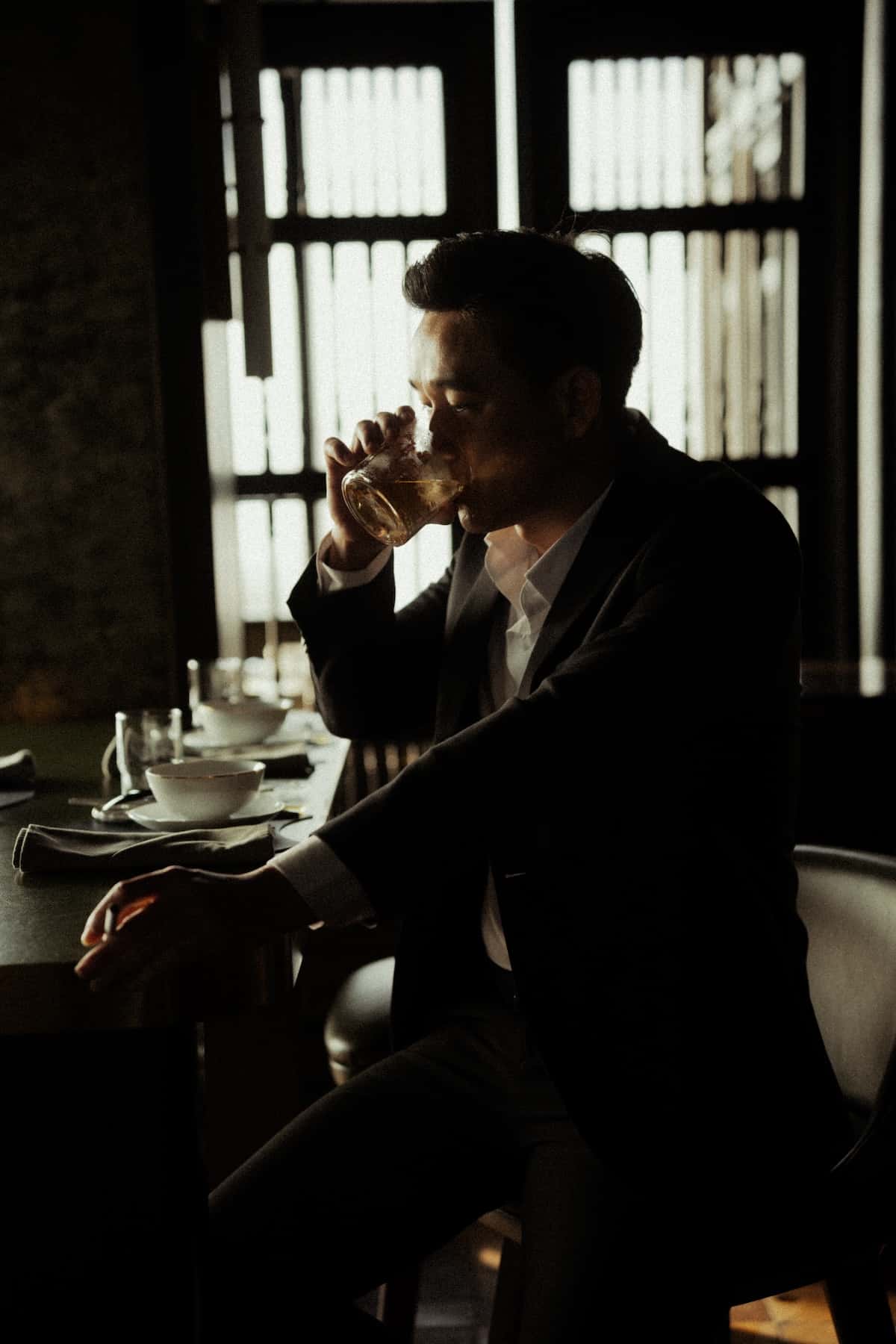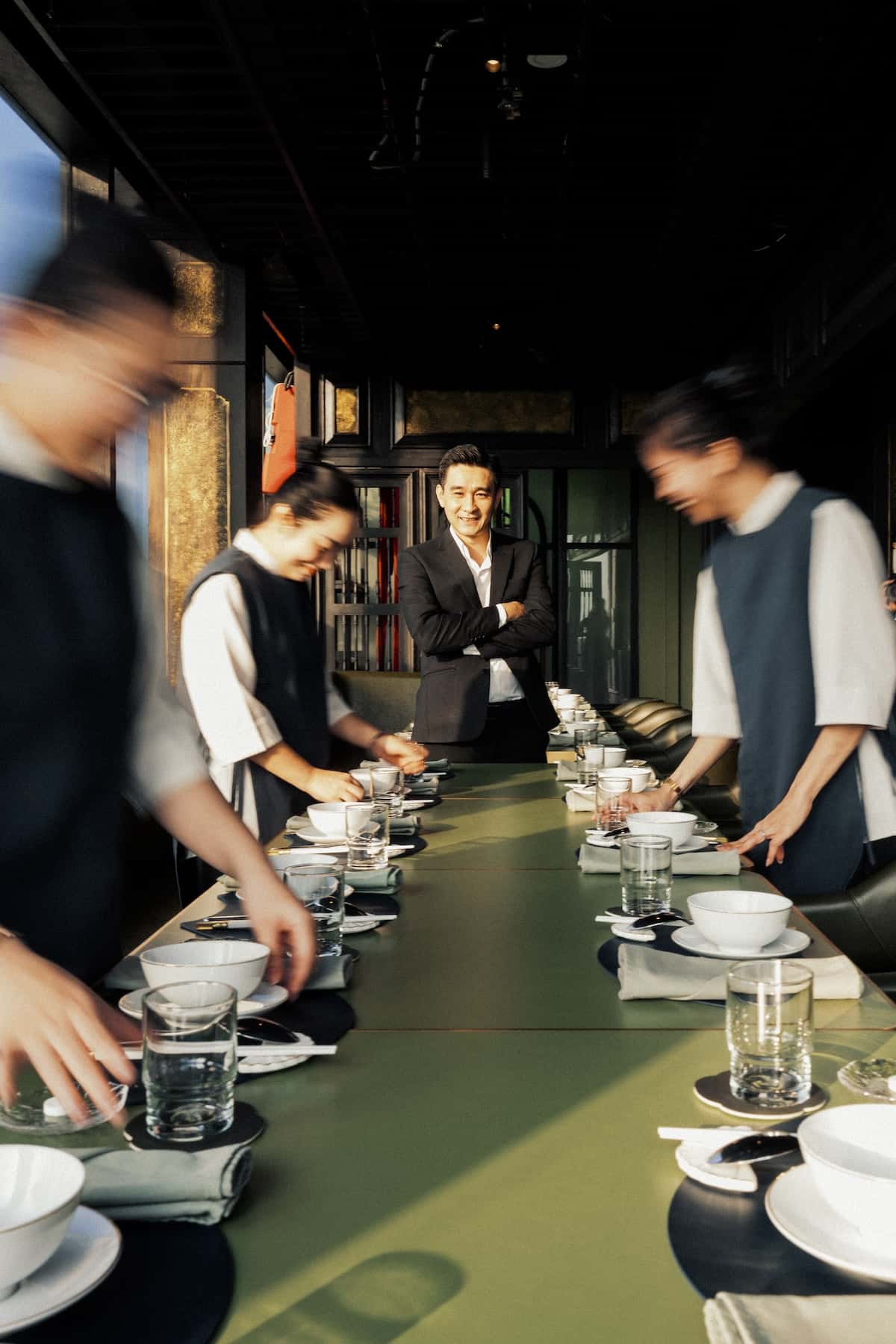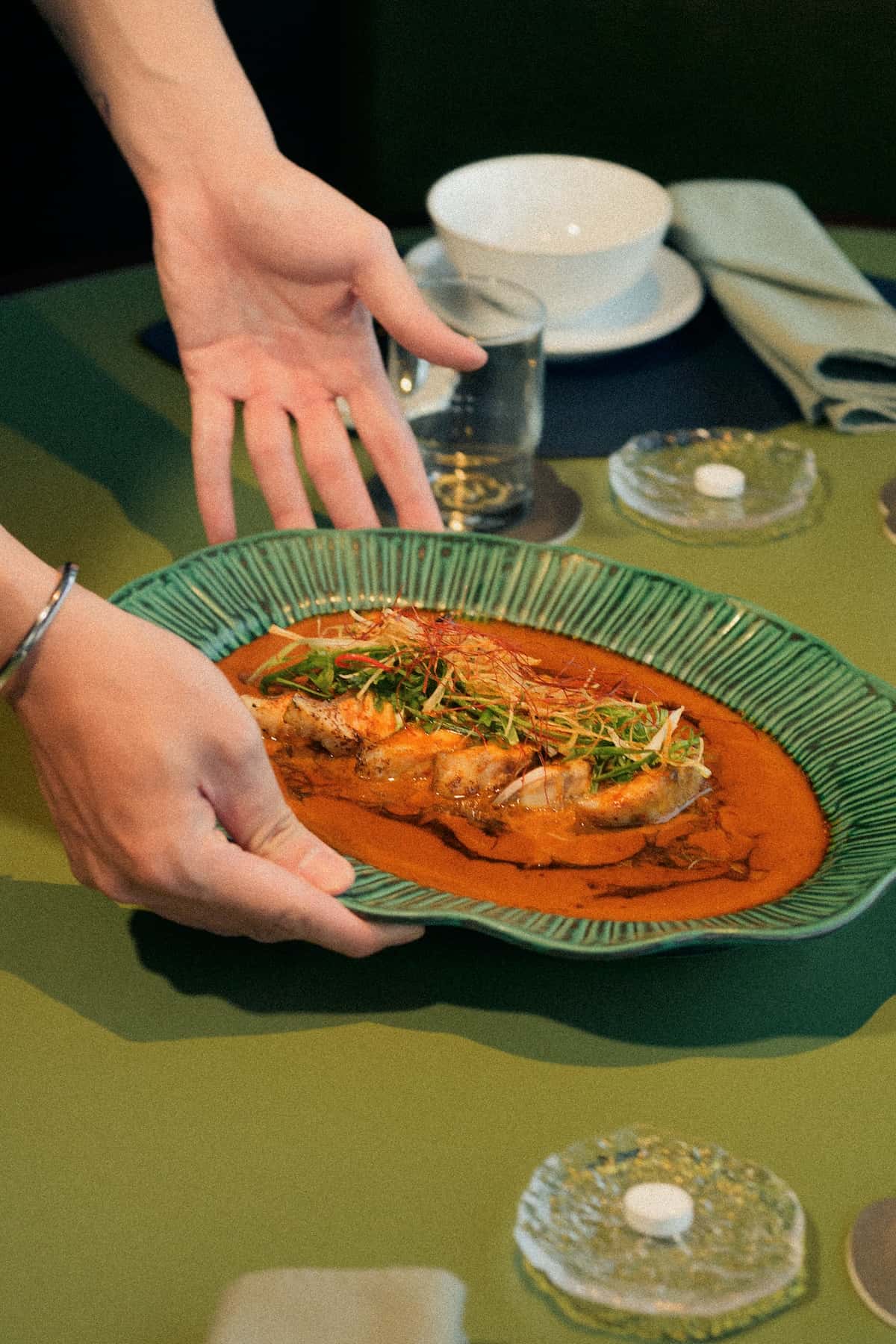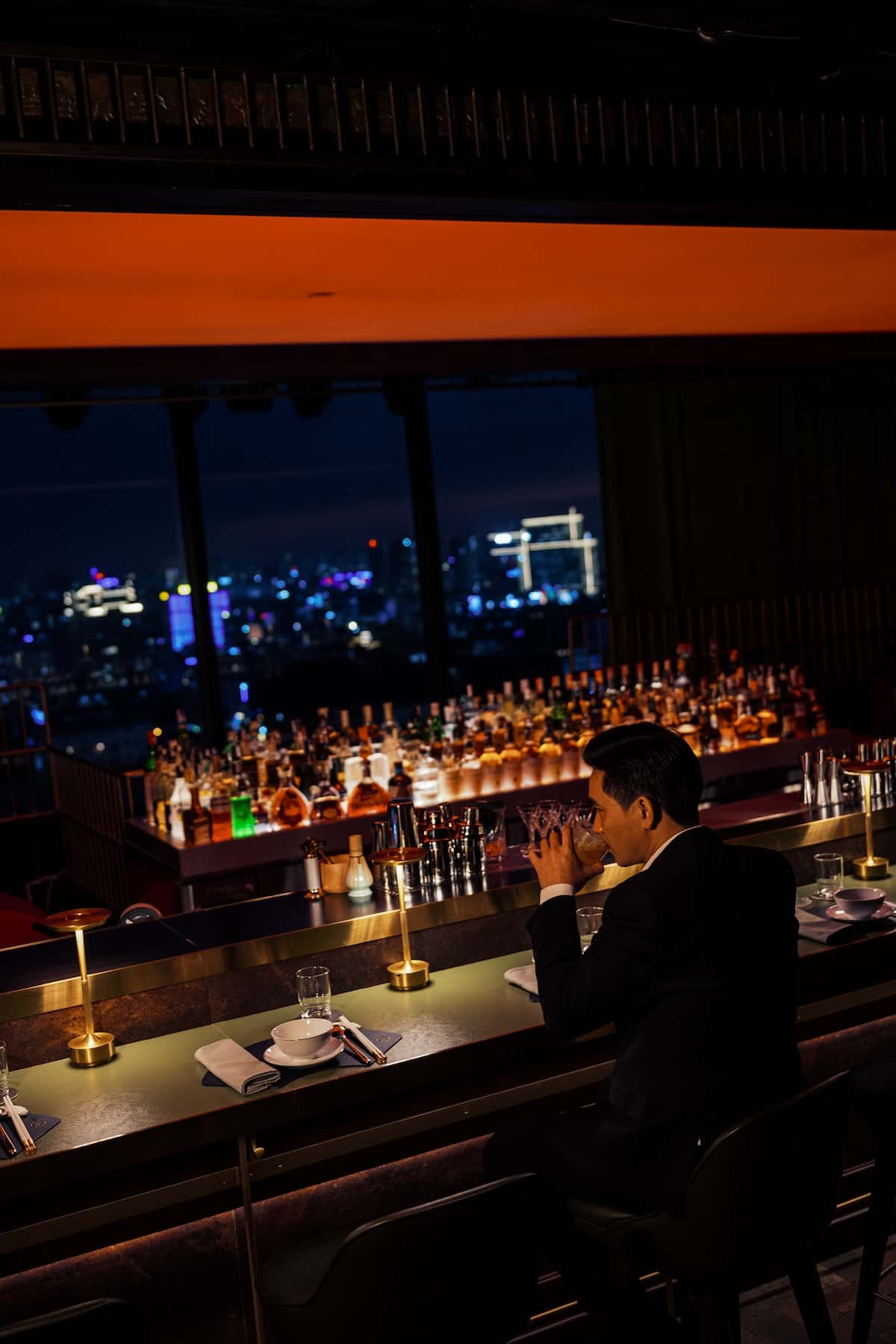DẠ夜 Dining has bewitched Dinh Chau, the restaurant-as-performance space, with dazzling views of the city’s impeccably composed general manager. As Chau puts his lips to his cigarette and paternally swirls his glass of whisky, he could be Chow Mo-wan, the journalist who’s the protagonist of Wong Kar Wai’s ‘In The Mood For Love’ – a movie that inspired DẠ夜 Dining’s design – lost in thoughts of fidelity and fate.
Beside him is the kind of red velvet curtain lining the corridors in the movie that Tony Leung as Chow Mo-wan and Maggie Cheung followed each other down. “Here, I do feel like a character in the kind of Hong Kong movies I love, and that I grew up on,” Chau sighs.

A Space Transformed by Light
The sun’s setting. And as it does it casts evening light through the windows of DẠ夜 Dining, past Chau to the team setting up the tables in preparation for tonight. “Before we opened, prior, even, to construction, we spent a lot of time on site here,” he murmurs. “We’d watch how the movement of the sun would affect the light entering in – affecting the mood of the venue.”
As the sun sets and the light softens, HỢP合, the rooftop’s sister venue upstairs, Chau reminds us, is waking up from its slumber. “Dusk soaks HỢP合 in a beautiful pink-orange hue,” he continues.
The lights of the DJ booth will begin pulsing, matching the flickering light across the Saigon skyline. The barisol – the vinyl ceiling panel that’s lit up enigmatically – on the canopy of the bar will take on a sympathetic soft yellow color. And, as HỢP合 wakes up, and downstairs DẠ夜 Dining tries to catch up, as the sky outside blackens, the lights transition to seductive reds and oranges. “DẠ夜 takes longer to get ready, as a lady has every right to,” Chau smiles.

Getting Into Character
Helping him get into character might be his Guangdong DNA, Chau wonders. Tony Leung who plays Chow Mo-wan was born in nearby Hong Kong.
Chau’s grandparents grew up there, in China’s most populous province before moving to Vietnam, which might account for his discerning taste towards Chinese cuisine. That’s not to say he’s a traditionalist.
“Food evolves as we all do. It’s a natural process,” he shrugs. Its identity can be preserved, he reckons, by not straying too far from the original. “It’s important, I think, that we understand and love the flavors of the original. To consider what makes the original stay in our hearts – the Shaoxing wine, the chili, the textures…”
DẠ夜 Dining’s Culinary Choreographer, Chef Son, has done that here, Chau feels, through a mix of elegant plating, that achieves a soft of quiet luxury. But, it’s the flavors of the food that really captivate. He describes them as “bold yet harmonious, soulful and hearty, with elegant touches.”

Making An Enigmatic Entrance
The journey to DẠ夜 Dining begins before one even enters the main space. “The quiet narrow hallway leading to DẠ夜 is almost like a wormhole,” Chau explains, his eyes brightening. “It transports you to a different, fictional era where things are classy and artful.”
As guests navigate this corridor, adorned with those beautiful modern metal lanterns that add “such an enigmatic, artistic
mood,” they’re already beginning their transformation. It’s a deliberate architectural choice—this liminal space between the bustling Saigon streets and the rarefied atmosphere of DẠ夜 Dining—allowing patrons to shed their everyday selves and step into the cinematic experience that awaits.

DẠ夜 Dining: A Feast for All Senses
The sensory journey continues once inside. In early evening, DẠ夜 carries a subtle, floral scent—a perfume reminiscent of night-blooming flowers. As the hours progress, these notes deepen into more sensual aromas of wood, leather, and skin—an olfactory transformation that mirrors the visual shift from day to night.
The crowning glory of DẠ夜’s culinary offerings might be the 14-day dry-aged truffle roasted duck. “A beautiful and harmonious blend between classics and innovation,” Chau says with evident pride. “Our duck is served three ways, with the first being a classic wrap with beautiful crispy skin and extra juicy meat, paper-thin pancake dipped in hearty house sauce.” The touch of truffle elegantly elevates this classic dish, much like how “a touch of freshly grated wasabi gives our duck fried rice an eye-opening upgrade.”
For the complete experience, Chau recommends pairing the duck with their Asian Fashioned cocktail. “It’s one of DẠ夜’s key highlights with elegant Asian elements on the base of a good Old Fashioned,” he explains, nodding to their stoic bartender Dat, the mastermind behind the drink program.
The Theatrical Elements At DẠ夜 Dining
There’s something about this space too that seems to transform everyone – and not only Chau – into actors. There are the atmospheric details that create tension – a subtle floral scent that captures you as you enter, or the fragrances of wood and leather drifting from a just-ordered Manhattan at the bar as the night wears on. There’s the Canto-Pop, curated from its 80s and 90s golden era, that greets you too. And the ornate metal lampshades that beckon gently towards the private dining room.
“DẠ夜 puts a strange spell on us all,” Chau decides. “Every artist moves, sings and even acts like they are in movies.” The stage is another element, elevating them, literally, to the spotlight. “But DẠ夜 offers us all the chance to be any character for the night,” he smiles mischievously.

The Heart of Nocturnal Saigon
Some nights the Canto-Pop makes way for Táo Lý, Chau’s favorite live band. Singers Lý Bá Minh and Bành Kiến Huy, backed by keyboardist Diệp Quốc Đạt and saxophonist Khải Phạm, emote from the Hong Kong golden era songbook.
But time’s up, Chau announces. The cigarette is long stubbed out. And he has to get back to preparations. They’ll decorate their private dining room with artful table-scaping – a guest has booked it for her birthday – plus, someone’s going to propose tonight in the restaurant too. Then they need to ensure they have enough 14-day dry-aged truffle-roasted ducks, and enough set menus, to satiate their stream of guests.
“We craft every night at DẠ夜 with so many different elements: the food, the drinks, the service, the performances,” Chau announces as he stands up. “Just like Sài Gòn, DẠ夜 Dining embraces the night, and is a celebration for anyone immersed in it.”
“Now I know, feelings can creep up just like that,” Tony Leung, as Chow Mo-wan, admits in the movie, ‘In The Mood For Love.’ And they keep doing too, for DẠ夜 Dining.










 Wink Hotels' is a new kind of Vietnamese hotel made for the modern traveler and ready to take on the world.
Wink Hotels' is a new kind of Vietnamese hotel made for the modern traveler and ready to take on the world.